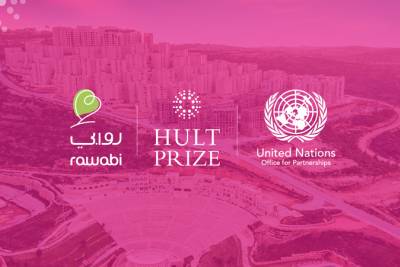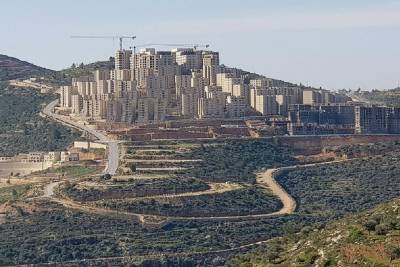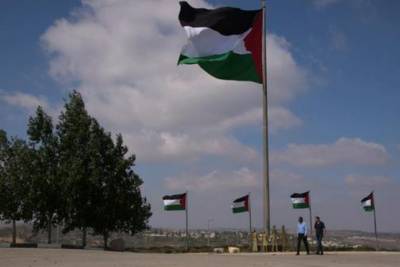Michael Jansen: Building hope
The Gulf Today - Rawabi is the dream town of Palestinian multi-millionaire Bashar Masri, from the well-known Masri clan of Nablus. The first new city to be built by Palestinians on Palestinian soil for generations and the first to be a planned city, Rawabi perches on two hilltops in the West Bank 20 minutes drive from the Palestinian administrative centre of Ramallah.
It is a handsome town of medium-rise buildings constructed of golden and white stone quarried from the hills and shaped on location. When finished, Rawabi will be a middle class town with apartment blocks, three schools, a splendid Romanesque amphitheatre, shops, sports facilities, restaurants, and cinemas.
The road to Rawabi is not easy to find once one leaves Bir Zeit which lies between Ramallah and Rawabi: my driver and I spend half an hour asking for directions for Rawabi but had to wait at a well-known landmark until our guide, Asma Salamah came to lead us to Rawabi.
In ancient times, it was said, “All roads lead to Rome,” but these days there is only one road that leads to Rawabi — and that road is rough and narrow and can be interdicted at any time by the Israelis, claiming “security” imperatives. For that reason, Asma says the contractors keep enough materials on site to continue work if traffic is disrupted.
Some 8,000-10,000 Palestinian construction workers from all over the West Bank are said to be involved in the building of the town, and 3,000-5,000 workers — high tech experts, clerks, guards, repairmen, cleaners, gardeners, and teachers — will be given employment in the town when it is populated.
Israelis from the nearby settlement of Ateret often harass and throw rocks at Palestinians employed at the site and tear down Palestinian flags that assert Palestinian sovereignty over this tract of land. Although construction began in 2010, the Israeli government refused to supply Rawabi with water until March of this year and can at any moment turn off the taps and the electricity as well as block the road.
However, Rawabi is no more vulnerable than any Palestinian city, town or village under Israeli occupation. This year the Israeli power company cut the supply of electricity to villages which had not paid their bills while Israeli soldiers routinely invade Palestinian urban areas to detain “suspects” and “wanted men,” engaging in shootouts with any who resist.
Rawabi, its name meaning “hills,” is nearing completion. The town, custom built on 1,557 acres of land for a population of 25,000 with the option of expanding to 40,000, will cost $1b. Masri has partly funded the project from his fortune and has secured hundreds of millions of dollars from the Qatar Investment Authority.
Although pledged to provide $140m in external infrastructure, the cash-strapped Palestinian Authority was unable to honour its promise. Consequently, finance has, at times, been tight.
Rawabi will have 23 differently designed neighbourhoods with views on the blue-green hills. Streets are paved with red, black and grey bricks. Each building and neighbourhood has parking arrangements, which, my companion says, could be inadequate.
The apartments furnished for display are spacious and comfortable but very similar. While buyers can choose between floor tiles, kitchens and other built-in fittings, but the range is limited. Damp has blistered the pai nt in at least one building.
Deputy manager Amir Dajani says, “We are starting the paperwork in the next couple of weeks for the 5,000 apartments. We need to make certain that all systems are ready. We were delayed for 18 months” due to Israel’s refusal to allow the contractors to lay a 1.1 kilometre pipe for water across “Area C,” the 62 per cent of the West Bank under total Israeli control.
Israel’s Makarot water company and its Palestinian counterpart have agreed to supply Rawabi with potable water. Recycled water will be used for irrigation and agriculture and provide surrounding villages with grey water for crops.
“Apartments cost between $80,000-$220,000, depending on size and location,” he states. Around 650 are said to have been sold as prices are one-quarter less than in Ramallah and one-third of the soaring prices in East Jerusalem. At the demonstration hall, potential investors can choose among four banks, including the Arab Islamic Bank, to arrange mortgages.
Professionals and civil servants are expected to buy flats here, preferring Rawabi to Ramallah which is a jumble of glass-sided high rise blocks built without planning or adequate infrastructure in a chaotic city choked with people and suffocated by constant Israeli pressure.
Rawabi staff and buyers are enthusiastic. Masri sees Rawabi as “nation building” and a model for other new Palestinian cities. However, Israeli settlers and right-wing ministers continue to condemn Rawabi and many Palestinians not only have doubts about the town’s viability but also argue that the city involves “normalising” relations with Israel.
On this issue, Palestinian opponents contend that the Israeli authorities have been involved in the project at every stage and Israeli firms have provided raw materials. Rawabi has also stoked resentment in the neighbourhood as it has been constructed on land confiscated under a decree issued by president Mahmoud Abbas in 2009 in spite of objections from landowners.
Former Palestinian foreign minister Nabil Shaath expresses doubts on about the viability of the city due to political changes that have taken place since 2007 when the project was proposed and 2010 when construction began. “Rawabi is in a bizarre situation: it is the last attempt to make economic peace” between Palestinians and Israelis and is nearing completion at a time there can be no economic peace because “the peace process is dead.”
To view original article, Click Here.



